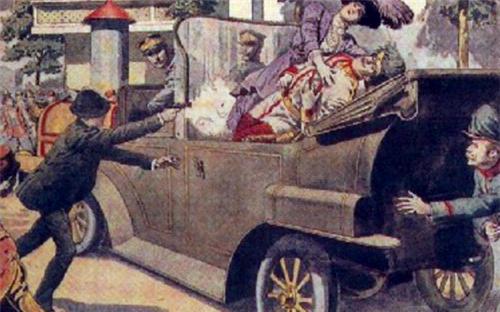The "Warring States Policy" once wrote: If the soldier will be angry, the corpse will be two, the blood will bleed five steps, and the world will be musu. Historically, I don't know how many changes have been caused by Assassins, such as the trigger of the First World War, which was caused by the assassination of Archduke Ferdinand of austria-Hungary by a young Serbian youth in 1914.
The name Toyotaro Koyama may be unfamiliar to readers, but in fact, 125 years ago, his name was widely known in China and Japan.

At 4:00 p.m. on March 24, 1895, in Shimonoseki City, Yamaguchi Prefecture, Japan, taking advantage of the time when the Qing Dynasty negotiator Li Hongzhang returned to the mansion in a palanquin, Koyama Toyotaro suddenly rushed out of the crowd and shot Li Hongzhang in the head.
Li Hongzhang fell down in response, his robe full of blood, and he immediately fainted. The surrounding crowd was panicked, Koyama Toyotaro was also subdued by the Japanese military police guarding him, as soon as this matter came out, the Sino-Japanese government and opposition were in turmoil, why would Koyama Toyotaro assassinate Li Hongzhang?
It turned out that with the fiasco of the Qing Dynasty in the Sino-Japanese Sino-Japanese War, the fearful Cixi appointed Li Hongzhang as plenipotentiary foreign minister to Japan for peace talks, demanding that he unconditionally agree to the conditions put forward by Japan, at this time, Japan's national strength, in fact, is also somewhat overwhelmed, so their main purpose is how to find a way to win more benefits from China, rather than endless fighting, under this premise, Li Hongzhang arrived in Japan, and Ito Hirobumi launched a fierce negotiation, and Japan put forward a sky-high price of 300 million taels of silver compensation. Li Hongzhang knew that once he agreed to this condition, he would become a traitor forever, and in the face of common pressure from Japan and Beijing, Li Hongzhang and the Japanese representatives fell into a stalemate.
At this time, however, the Japanese radicals did not do anything, believing that they had a better chance of killing Beijing and occupying China, so why stop it immediately? Koyama Toyotaro was a member of the Japanese right-wing group "Excalibur", and he thought that as long as Li Hongzhang was killed, then China and Japan would continue to fight, thus launching an assassination campaign. And so it happened.
Fortunately, Li Hongzhang was not in serious trouble, but the whole of Japan was deeply shocked, and the world theory was also in an uproar, and in order to save face, the emperor sent his own imperial doctor and court maid to Maguan, and asked Prime Minister Itō Hirobumi to bring a handwritten letter of condolence, as well as a bandage personally woven by the empress to li's resting mansion to offer condolences.
In the subsequent talks, Japan lost some money, and under the agreement between the two sides, the amount of reparations was changed from 300 million taels to 200 million taels. And this bullet of Koyama Toyotaro made the Qing Dynasty pay 100 million taels less.
What happened to him? After this incident, Ito Hirobumi was not lightly angry, he believed: "If Li Hongzhang uses the excuse of being injured as an excuse to return to China in the middle of the way, he will be more bitter about the behavior of the Japanese people; he cleverly tempts European and American countries to ask them to be in the middle again, at least it is not difficult to win the sympathy of the two or three european powers, so if a certain power wants to take the opportunity to intervene, it is possible to use Lee's injury as the best excuse.", so Oyama's move is really "stupid" and "reckless of the country's grand plan", and he resolutely asked the court to sentence him to death, but the Japanese court has considered it heavily. In the end, Xiaoshan was sentenced to life imprisonment.
In 1907, Oyama was pardoned and released from prison, ironically, the rise of militarism in Japan made him a celebrity because of the assassination of Li Hongzhang, and by 1938, on the eve of Japan's launch of the July 7 Incident, Oyama also wrote a memoir of the assassination of Li Hongzhang. He was about seventy years old, and he was truly a model of an old hero. Looking at his melodious attitude from his eyes, he couldn't help but admire that this eye was sharper than in the photo. "Maybe Xiaoshan wants to show his bravery by praising Li Hongzhang!" In the end, Oyama lived to 1947, when Japan had surrendered for two years, and I wonder if Oyama's thinking changed later.